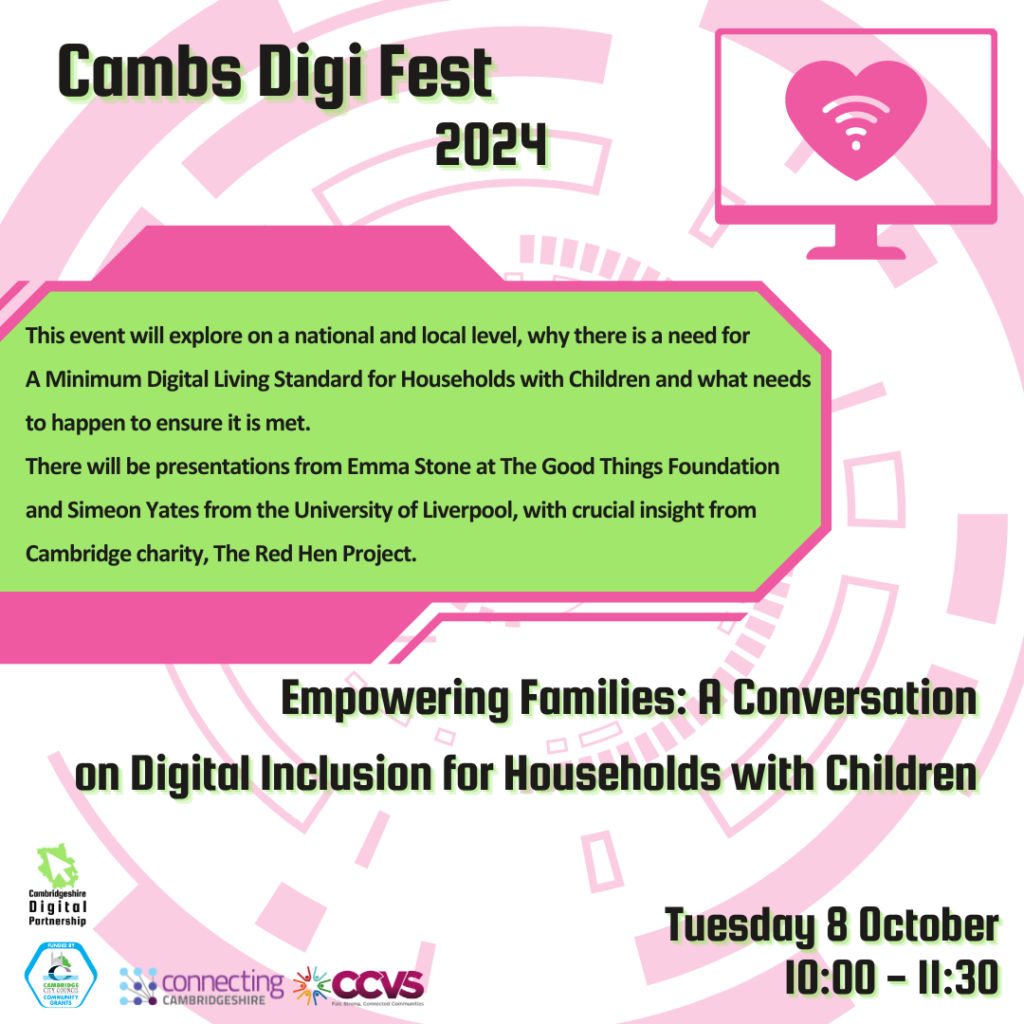Empowering Families: A Conversation on Digital Inclusion for Households with Children

8 October 2024
Thank you to all who joined us for this webinar, our first event for Cambs Digi Fest hosted by Sally Page, Deputy CEO at CCVS and Will Plant, Digital Inclusion Lead at Connecting Cambridgeshire!
We had some amazing guests!
Simeon Yates, Professor of Digital Culture in the Department of Communications and Media at the University of Liverpool and Joint Director of the Digital Media and Society Research Institute, along with Dr. Emma Stone, Director of Evidence and Engagement at Good Things Foundation– the UK’s leading digital inclusion charity, talked to us about Minimum Digital Living Standard for Families (MDLS).
Rachel Bennett, Head of Service Delivery and Stacy Bainbridge, Poverty Project Worker for the Red Hen Project joined us to then put this research into context, sharing the experiences of families they work with.
You can view the presentations here:
Notes
Prof. Simeon Yates stated that a big team was involved in the MDLS project, and explained how they measured digital inequality.
He said that existing research told them that the ‘household’ matters, and because of this they wanted to speak directly to focus groups from different household types.
What is ‘enough’ for households? This was the question posed to the participants.
What devices and skills are needed and how does that change as families grow and for children at different stages at school?
They found that:
- 81% of families met MLDS
- 15% partly meet MDLS
- 4% fail to meet MDLS
They explored different digital skills such as:
- using secure passwords
- avoiding in-app purchases
- knowing what details to share online
- evaluating friend requests
- knowing how to report offensive content
- understanding your digital footprint
27% of parents, 31% of secondary school children and 49% of primary school children were missing these skills.
Adding all this data together they concluded that 45% of households with children are below MDLS.
This is 4 in 10 households!
Single parents, households with more than two children, where the respondents identified as non-white, those with health issues and those receiving benefits were all predictors.
Dr. Emma Stone said they started to then think about barriers and how they could help people with this evidence.
- Welsh and Scottish government have already acknowledged the MDLS
- Lots of engagement of place-based networks looking at digital inclusion
- Government and UK datasets thinking about further research and how to help
Emma then goes on to explain about what good work is happening already, using the London Borough of Camden as an example, they’re MDLS with their workforce and residents.
Emma hope the presentation is food for thought and could help with future work and strategies.
Rachel from Red Hen said they work with deprived families and explained their services and activities. They build relationships with families that don’t always trust services. Rachel said she found the research very interesting and the two things that stood out were that:
- Digital exclusion makes it harder to get out of poverty
- Motivation, confidence, trust and experience shape people’s online access
Stacy is the trusted adult for their service users.
Stacy stated that some people don’t understand the wording on digital forms, worried they would complete it wrong and sometimes forms were not compatible on mobile phones.
There was also an issue with mental health – if some people can’t do it online then they can’t face seeing people face to face or talk on the phone.
There were also language barriers sometimes too.
School homework is now online, the parents don’t want to ask the school for help as they feel they will be stigmatized further.
Red Hen witness a lot of people “burying their heads in the sand” when they can’t complete forms online.
Rachel said that community groups help, and Stacy reflected on a group trip where the parents helped each other complete their Universal Credit journals on their phones. They worked together as a team and friendships were made.
Rachel concluded by saying; we are trying help people keep up but also realise the importance of human connection with digital. Parents get invited to online webinars but this isn’t working for all families. We still need face to face services as well as being online.
Emma agreed that fear of making a mistake is a big thing, as they get penalised. For example, not updating their Universal Credit journal and so it traps people in poverty.
Discussion
Some interesting points were raised afterwards including:
- Organisations and government need to work together for digital inclusion as it will boost economic growth and help access health services.
- Optimistic that the Secretary of State for Science, Innovation and Technology, Peter Kyle and MP, Sir Chris Bryant are making digital inclusion a priority.
- Digital inclusion is both a top-down and bottom-up thing as charities like Red Hen need funding.
- Bringing people together is key. The Cambridgeshire Digital Partnership does this.
- Even digitally savvy people are struggling with new complex digital systems which they are forced to use – such as children at school and young adults at college.
- Digital is becoming punitive.
- Hardly any face to face services. This is becoming extremely difficult for everyone.
- The Good Things Foundation is excellent for support and advice.
Thank you to all that attended.
To keep up to date with our news please sign up to our newsletter: Subscribe to CDP Network